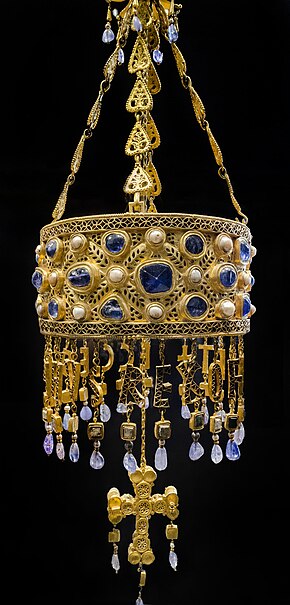
Back Wes-Gote Afrikaans Visigodos AN قوط غربيون Arabic لݣوط لغربيين ARY ڤيسيجوث ARZ Visigodos AST Vestqotlar Azerbaijani ویزی قوتلار AZB Вестготы Byelorussian Вэстготы BE-X-OLD
Visigothi | |
|---|---|
 The eagles represented on these fibulae from the 6th century, and found in Tierra de Barros (Badajoz), were a popular symbol among the Goths in Spain.[a] | |
| Religion | |
| Gothic paganism, Arianism, Nicene Christianity, Roman paganism | |
| Related ethnic groups | |
| Ostrogoths, Crimean Goths, Vandals, Gepids |

The Visigoths (/ˈvɪzɪɡɒθs/; Latin: Visigothi, Wisigothi, Vesi, Visi, Wesi, Wisi) were a Germanic people united under the rule of a king and living within the Roman Empire during late antiquity. The Visigoths first appeared in the Balkans, as a Roman-allied barbarian[1] military group united under the command of Alaric I. Their exact origins are believed to have been diverse but they probably included many descendants of the Thervingi who had moved into the Roman Empire beginning in 376 and had played a major role in defeating the Romans at the Battle of Adrianople in 378.[2] Relations between the Romans and Alaric's Visigoths varied, with the two groups making treaties when convenient, and warring with one another when not.[3] Under Alaric, the Visigoths invaded Italy and sacked Rome in August 410.
The Visigoths were subsequently settled in southern Gaul as foederati to the Romans, a relationship that was established in 418. This developed as an independent kingdom with its capital at Toulouse, and they extended their authority into Hispania at the expense of the Suebi and Vandals who had taken control of large swathes of Roman territory. In 507, Visigothic rule in Gaul was ended by the Franks under Clovis I, who defeated them in the Battle of Vouillé.
It is within what is now Spain and Portugal that the Visigoths created the polity for which they are best remembered. During their governance of Hispania, the Visigoths built several churches that survived and left many artifacts, items which have been discovered in increasing numbers by archaeologists in recent years. The Treasure of Guarrazar of votive crowns and crosses are the most spectacular among the finds thus far. In or around 589, the Visigoths under Reccared I converted from Arian Christianity to Nicene Christianity, gradually adopting the culture of their Hispano-Roman subjects.[4] Their legal code, the Visigothic Code (completed in 654), abolished the longstanding practice of applying different laws for Hispano-Roman population and Visigoths. Once legal distinctions were no longer being made between Romani and Gothi, they became known collectively as Hispani. In the century that followed, the region was dominated by the Councils of Toledo and the episcopacy. In 711, an invading force of Arabs and Berbers defeated the Visigoths during the Battle of Guadalete. The Visigoth king, Roderic, and many members of the Visigothic governing elite were killed and their kingdom rapidly collapsed.[5] This was followed by the subsequent formation of the Kingdom of Asturias in northern Spain and the beginning of the Reconquista by Christian troops under Pelagius.[6]
The Visigoths founded the only new cities in western Europe from the fall of the Western half of the Roman Empire until the rise of the Carolingian dynasty. Many Visigothic names are still in use in the modern Spanish and Portuguese languages. Their most notable legacy, however, was the Visigothic Code, which served, among other things, as the basis for court procedure in most of Christian Iberia until the Late Middle Ages, centuries after the demise of the kingdom.
Cite error: There are <ref group=lower-alpha> tags or {{efn}} templates on this page, but the references will not show without a {{reflist|group=lower-alpha}} template or {{notelist}} template (see the help page).
- ^ Wood 2012, p. 16.
- ^ Heather 1998, pp. 52–57, 300–301.
- ^ Waldman & Mason 2006, p. 843.
- ^ Claude 1998, pp. 119–120.
- ^ O'Callaghan 1975, pp. 91–92.
- ^ O'Callaghan 1975, p. 98.
© MMXXIII Rich X Search. We shall prevail. All rights reserved. Rich X Search